 |
|||||||||||||||
STORY LINK: "Dreams of Homegrown Spaceflight" on Space Daily |
||
"Dreams of Homegrown Spaceflight" The Astronaut Farmer takes us on a quest for the grail of private access to space by Michelle Evans, February 2007
“If you have a dream, you have to follow it, you at least have to try. And if you have people supporting you, it certainly helps,” Billy Bob Thornton told me in a recent interview.
Thornton plays The Astronaut Farmer in the new film of that name from Warner Brothers that is all about dreams and making them a reality, no matter how far-fetched they may seem to others, or even to yourself. In this case, Billy Bob plays Texas rancher Charles Farmer, a former NASA test pilot who flew in the X-15 program and was in line to become an astronaut himself before family matters intervened, forcing him to give up his goal of spaceflight.
Years later, that spark within Farmer is still lit, and he finally takes matters into his own hands to make it happen. He chooses the Mercury-Atlas design, used so successfully for John Glenn 45 years ago when he became the first American to orbit Earth. Scrapyards really do carry many of the items someone might need to make this happen. Farmer takes to the task, converting his barn into a launch complex, cobbling together his rocket and spacecraft, hoping to stay under the radar of the government long enough to make his flight. With the support of his wife and daughters, and the hands of his teenage son, the dream takes shape. It is only when he is close to completion that problems arise, as his attempts to purchase the high-powered rocket fuel, needed for launch, mark him as a possible terrorist.
How much oversight should our government give in a case like this? Our country was founded on freedom to do pretty much what we wanted, as long as it doesn’t harm others. Where do we draw that line to stop someone, even before he reaches that point? These are important questions that are delved into with much heart in this movie. It could almost be about any major dream someone might have, but what better metaphor than to travel beyond our planet and see Earth from outer space?
As writer and producer Mark Polish told me, “We made the plot very similar to filmmaking. There are a lot of parallels, getting family support, the financial aspect of it all. It feels like every time you’re making a movie, you’re launching a rocket, and if it doesn’t open well, it’s like your rocket going sideways!”
And that is certainly the case here. All does not go well as the bank wants to foreclose, NASA tries to bribe him out of launching, and his friends all start to believe that the eccentric down the road may actually be a nut case to be locked away.
Farmer wants to get into orbit, as do many people stuck on planet Earth. Luckily, there are people working to accomplish this in real life. The first people who often come to mind are Burt Rutan and Richard Branson with their planned SpaceShipTwo suborbital flights. However, as Space Shuttle Commander Rick Searfoss points out, “They have a fantastic team they’ve put together, but they’re not the only geniuses in town.”
“The concept of maybe not an individual, but a small group of people, doing very creative things with new technologies, that is happening in reality,” he continues. “There’s private venture going to the edge of space. It’s happening right now.” Rick should know, since he is a part of just such a team at XCor Aerospace in Mojave, California.
Many of these companies are what you would classify as “garage shops.” Sometimes they literally started out life that way. This is certainly the feeling portrayed in the movie as we see the Farmer Space Program take shape. A great example is that Mission Control is an ancient Airstream trailer, with his son in charge of communications.
When NASA sends out the big guns, in the form of Chief Astronaut Col. Masterson (Bruce Willis in an uncredited role), to try to stop Charlie, you can see the admiration in his eyes when he realizes Farmer might actually pull it off. However, he must maintain the company line by telling Farmer that NASA will never let him launch his “John Deere riding lawnmower to orbit.”
The Federal Aviation Administration, in full-swing government-bureaucratic style, schedules a hearing to decide Charlie’s fate. In the meantime, he takes his three children out of school to help him full-time before he can be stopped. When his son’s teacher objects, he tells her flat out, “You’re teaching him to read history, I’m going to show him how to make history.”
Once the FAA hearing starts, it is obvious they will do everything they can to shut him down. Farmer responds, “Somewhere along the line we stopped believing we could do anything.” They tell him to give up his dream and he says, “If we don’t have our dreams, we don’t have anything. You people are pretty good at assassinating people who have dreams.”
In many ways, it should be considered sad that after almost a half century of human spaceflight, most people still see becoming an astronaut as the unobtainable goal. For the average Joe (or Charlie) to think they belong in space, it isn’t just the FAA that thinks you should get real. Too many people may share that view, but that is definitely changing. I asked Rick Searfoss if the movement toward private spaceflight would bring about a paradigm shift in the perceptions of the general public toward space.
“I think we already at least have our foot in the door towards that. Right now it’s really just the fans and the space buffs that are really zeroing in on it, but I give a lot of public talks, mostly on teamwork and leadership to business audiences, and I talk about the principles of why the X Prize succeeded, why it sparks people’s imaginations, and I’ve been pleasantly surprised, even with sales groups and business people, that they are aware of it. They get it.”
In a scene early in the movie, Farmer comes to his son’s class for career day wearing his astronaut pressure suit. Afterward, the condescending teacher tells him how wonderful it is that he did such a thing, whereas most other parents would have just worn a clown suit. She extorts how “science isn’t sexy.” Unfortunately, this is often the case, and it is wonderful for a movie of this stature to take on this subject and tell us all that it is sexy to have a dream and to believe in science.
Searfoss explains, “We are in a dangerous state for our country right now as far as the number of kids going into math, science, and engineering, the future workforce we need to move us forward. It’s kind of scary, actually. Many of the big aerospace companies wring their hands and say they need to think about this. Well, Burt Rutan has a wonderful way of putting it. He says he has no problem hiring who he needs for Scaled Composites because they’re working on great stuff. He says—as he’s sticking his finger in the eye of Big Aerospace—if you give them interesting stuff to do, they’ll come, they’ll flock to you, and he has no problem hiring the best people. That’s what the pull of the private sector is like. The exciting thing is that there is so much Charlie Farmer kind of action going on with small companies.”
Later in the movie, when the Atlas finally roars to life and heads toward space, everyone becomes transfixed. With the reflection of the rocket and its pillar of smoke and flame in the window of the school, the kids race to that window in awe. This is the message worth sending to everyone. As Searfoss pointed out, people really do get it. People want to go. The movie’s writer (along with brother Michael), Mark Polish, told me he’d love to go into space. “We built the rocket that we would want to build. We picked the Mercury-Atlas because of how romantic and cinematic it is. That was a really great time in our culture, when you had a lot of people believing in the same dream.”
Virginia Madsen, who plays Charlie’s wife, Audie, agrees, “I would love to orbit the Earth. I think it would be so incredible. I’m just waiting for the price to come down!”
For now, we can ride on Charlie Farmer’s coattails, or should I say, rocket exhaust. When you can impress someone like Richard Searfoss, who has three spaceflights and nearly a thousand hours orbiting the Earth, you’ve definitely accomplished something wonderful. He said, “From the point of view of the emotional rollercoaster that astronauts and their families go through, I was amazed at how realistic it really is. It’s great how, as Charlie Farmer is pursuing his dream, he has the support of his family, but, of course, he’s so focused on that dream, there’s other consequences throughout. Some of those conversations around the dinner table were the kinds of conversations I had with my family.”
The Astronaut Farmer has a wonderful time taking us along on the dream of actually taking a private spaceflight. Sure, it is fantasy right now, but you have to have the dream first to create the reality later.
“We go to movies to be entertained, and that’s really what this is,” says Billy Bob Thornton. “It’s a movie that’s supposed to move you, and make you laugh, make you think a little. It’s about this family and about this dream, and about how this society doesn’t encourage dreamers anymore. If we get that across, then we did our job. We’re not that interested in impressing a bunch of rocket scientists. If we do, that’s great!”
Searfoss agrees. “The technical accuracy of the movie is designed for a story, it’s not a documentary. Given how it was designed, I thought it was done extremely well. And I loved the whole human side of it.”
And that’s the core of this movie. It is a human story about the fact that it is okay to think of a bright future, that maybe the government needs to take a step back to let people do that sometimes. And the ultimate payoff for that type of thinking may be that we really do get off Earth to create a spacefaring civilization.
This thought resonated with Billy Bob enough that he didn’t even finish the script before deciding to do the movie. “I called my agent and I said, ‘Look, unless the ending really stinks, then I want to do this movie!’ I loved it right away.”
The Astronaut Farmer lives inside all of us. We may not have the wherewithal to build our own rocket in a barn and fly into space, but we have our own dreams that can and should be fulfilled. Charlie Farmer can teach us all how important that is by giving us the inspiration of seeing Earth from space.
“The best part is seeing the planet,” Rick told me of his real experiences on orbit, “It’s almost a spiritual experience to see the planet. It’s just touching to see how beautiful it is, and I think that’s communicated in this movie. Billy Bob portrays a sense of reverence and awe, almost a sense of disbelief, that he’s actually there. Those are all pretty solid emotions that astronauts feel. Even when you’re working, cranking away and worried about not getting behind on the timeline, in the back of your mind there’s still this emotional kind of thing going on, like ‘I can’t believe I’m here. How beautiful this is. It’s incredible.’ It’s kind of the ultimate in multi-tasking.”
Bruce Dern, as Farmer’s father-in-law, gives us the most important line in the movie to remember. He says, “I couldn’t get my family to eat together. You have your family dreaming together.”
Upon finally gaining orbit, Charlie whispers, “This is where the dreams live.” XXXX |
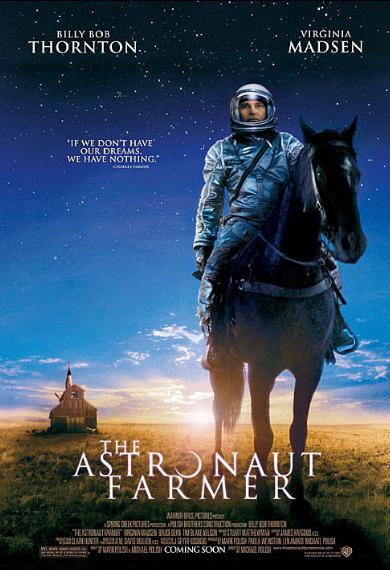 |
||||||||||||||
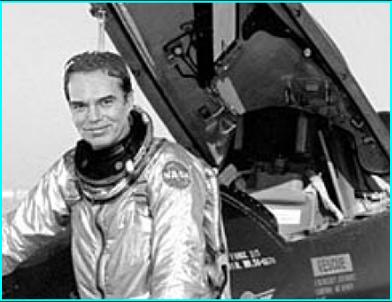 |
|||||||||||||||
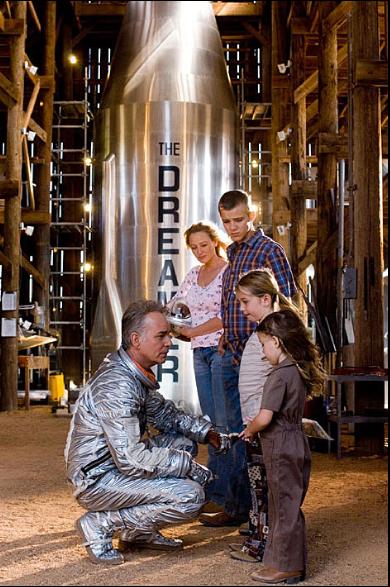 |
|||||||||||||||
 |
|||||||||||||||
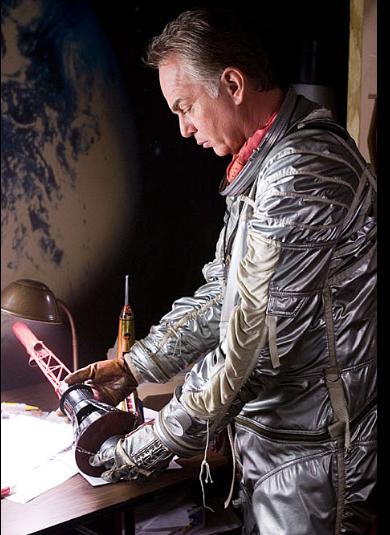 |
|||||||||||||||
 |
|||||||||||||||
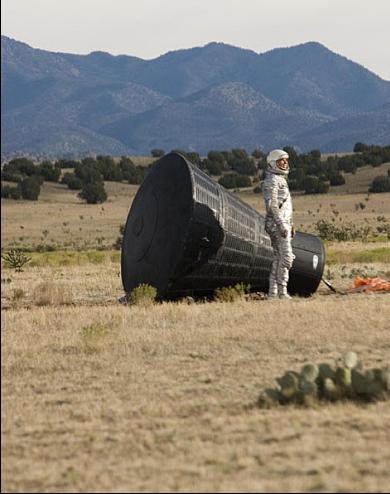 |
|||||||||||||||
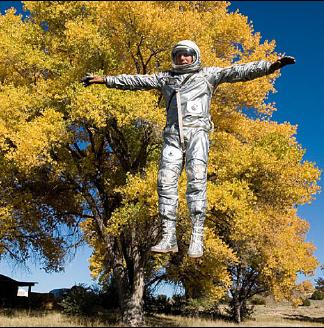 |
|||||||||||||||
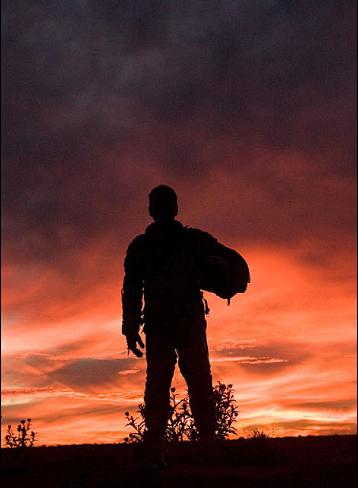 |
|||||||||||||||